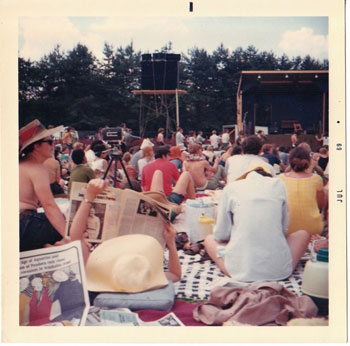Column: Singin’ the Ann Arbor Blues

The crowd at Fuller Flatlands, site of the first Ann Arbor Blues Festival 40 years ago. (Photo courtesy of Bob Frank, www.bluelunch.com.)
Forty years ago this month, a great crowd of young people converged on a small, unsuspecting middle-American town for an incredible three-day celebration of peace and music. They sat on the cool grass of an open field, grooved to the tunes of a dizzying array of legendary performers, smoked pot, drank wine, and generally had a blast. It was a landmark event that is still spoken of in hushed tones of awe and reverence among music historians.
No, it wasn’t Woodstock. It was something similar, yet very different, something smaller yet in some ways bigger.
It was something called the Ann Arbor Blues Festival.
In early August 1969, two weeks before the mammoth fete in Bethel, N.Y., approximately 20,000 eager spectators came to the Fuller Flatlands on the banks of the lazy Huron River to hear an absolutely astounding lineup of living legends of the blues – B. B. King, Muddy Waters, Howlin’ Wolf, Otis Rush, Magic Sam, Big Mama Thornton, Son House, T-Bone Walker, Lightnin’ Hopkins, and on and on – at the first major blues festival in the United States.
Although the Ann Arbor event has been almost completely overshadowed by its big brother in New York, to many serious music fans – especially blues enthusiasts – it is by far the more important of the two. Writing in the October 1969 issue of Downbeat, critic Dan Morgenstern made his preference plain, dismissing Woodstock in favor of the Ann Arbor Blues Festival, which he declared was “without doubt the festival of the year, if not the decade.” [Full Story]



